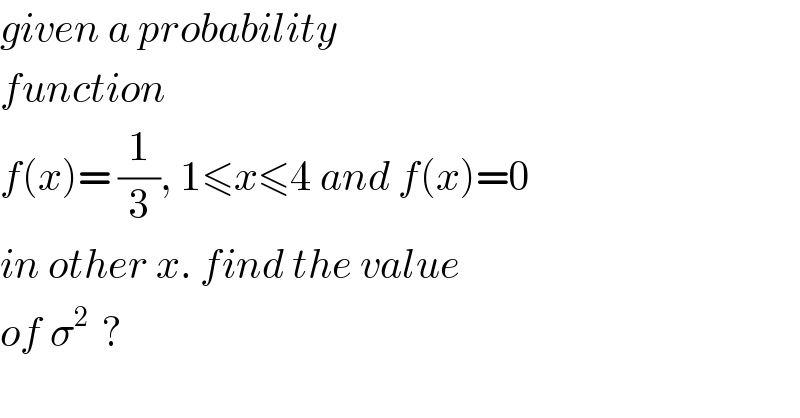Question Number 81219 by jagoll last updated on 10/Feb/20

Commented by jagoll last updated on 10/Feb/20

Commented by Joel578 last updated on 10/Feb/20

Commented by Joel578 last updated on 10/Feb/20
![another formula σ_X ^2 = ∫_(−∞) ^∞ (x − μ)^2 f(x) dx = ∫_(−∞) ^∞ (x^2 − 2xμ + μ^2 )f(x) dx = ∫_(−∞) ^∞ x^2 f(x) dx − 2μ ∫_(−∞) ^∞ x f(x) dx + μ^2 ∫_(−∞) ^∞ f(x) dx = ∫_(−∞) ^∞ x^2 f(x) dx − 2μ . μ + μ^2 . 1 = ∫_(−∞) ^∞ x^2 f(x) dx − μ^2 = E[X^2 ] − μ^2](https://www.tinkutara.com/question/Q81241.png)
Commented by jagoll last updated on 10/Feb/20

Answered by Joel578 last updated on 10/Feb/20
![f_X (x) = { (((1/3) , 1 ≤ x ≤ 4)),(( 0 , elsewhere)) :} E[X] = μ = ∫_(−∞) ^∞ x f(x) dx = ∫_1 ^4 x((1/3)) dx = (5/2) E[X^2 ] = ∫_(−∞) ^∞ x^2 f(x) dx = ∫_1 ^4 x^2 ((1/3)) dx = 7 σ_X ^2 = E[X^2 ] − μ^2 = 7 − ((25)/4) = (3/4)](https://www.tinkutara.com/question/Q81239.png)
